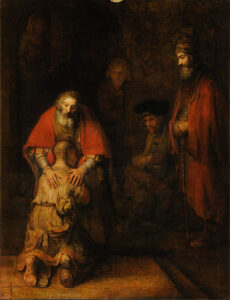Perhaps no other parable is as striking and moving as the Parable of the Prodigal Son. It is the third and last of a set of parables on mercy. The two that precede it are the parables of the Lost Sheep and of the Lost Coin. While these two represent a sinner’s search for the Heavenly Father, the story of the Prodigal Son shows how the Father searches for and receives a contrite sinner – not commending his sins, for sure, but forgiving them. That is why the parable strikes a chord with everyone.
The Parable has been variously titled the ‘Parable of the Two Brothers’ or ‘Two Sons’ or yet the ‘Lost Son’. But that is to look merely at the human side of the story. By thus limiting its scope we are likely to turn a deaf ear to the true message of what is by now a very familiar tale. So, it is hugely important that we look at it as a harbinger of hope and joy.
Hope and joy cannot spring from, or be sustained by, human endeavours alone. For instance, despite the inherent drama of the parable in hand, it would be just another story if divested of its divine radiance. It is, therefore, not farfetched to alternatively title it the ‘Parable of the Loving Father’ or of the ‘Forgiving Father’ – or even of the ‘Prodigal Father’, in the best sense of the term, that is, one who loves bountifully! After all, divine love and forgiveness are ever-fresh even two millennia after Jesus made it known.
The present parable tells of the younger of the two sons who, by demanding the share of inheritance due to him, infringed tradition and offended his father. He squandered his wealth in loose living and, only when in dire straits, retraced his steps, mentally prepared to work as a servant in his father’s house. Much against his expectation, his father not only welcomed him with open arms but also treated him as a beloved son – as if nothing had happened. No doubt the mother is sorely missing from the scene; but perhaps that is only to show her love is encompassed in God’s omnipotent goodness.

It is obvious that the young man considered that he deserved stringency, not mercy. On the other hand, Pope John Paul II, in his encyclical Dives in Misericordia, says that his father’s joyful response indicates that ‘even if he is a prodigal, a son does not cease to be truly his father’s son; it also indicates a good that has been found again, which in the case of the prodigal son was his return to the truth about himself.’
What a soul-stirring finale that would have made except that the elder brother literally spoilt the party. On the face of it, he was not wrong. Had not the Benjamin received his share and left the father’s house merry as a bird? Had not his actions disgraced the family? While this is undeniable, is it not equally true that the habitually decorous elder brother was now being self-righteous, resentful, selfish, jealous, and merciless? He may have adhered to the letter of the law, but not its spirit!
We can identify ourselves with the Parable because we are like either of the sons. The Encyclical notes that the younger son ‘in a certain sense is the man of every period, beginning with the one who was the first to lose the inheritance of grace and original justice.’ We may smugly condemn the younger one – he has done something awful that none can accuse us of! We do not forget his flaws, much less appreciate his regrets. We fail to thank God that no such slip-up has landed us in a bad situation. We fail to realise that we ‘all have sinned and fallen short of the glory of God’.
The good news is that we can change it for the better if we walk back towards our father – the only perfect character in the Parable. He was sinned against by both his sons, but holds it not against them. He represents God the Father who is always happy to find His lost sons – you and me; and to call upon others – symbolised by the elder son – to partake of that joy. The Parable is a fitting response from Jesus to those who had criticised Him for accepting tax collectors and other public sinners at His table. But then, had God kept a record of our sins, who would survive? So, let’s go ahead and ‘forgive those who have sinned against us.’
That God treats us with love and mercy calls for great rejoicing; it is a crowning of our poor little spiritual journey. That is why the fourth Sunday of Lent is called Laetere Sunday, from the words ‘Laetare Jerusalem’ (‘Rejoice with Jerusalem’, Is. 66:10) in the Latin introit for the Mass of the day. This is a refreshing change in the midst of the sombre mood of Lent. That the Gospel has revealed the Father’s infinite love and mercy and the possibility of our reconciliation with Him and our neighbour is the ultimate reason for our joy.
“Our Cause of Rejoicing ” ….a meaningful and beautiful read. Thank you Oscar
My pleasure, Ingrid. Thanks for reading.
As always, lucid and a unique way of looking at the parable of the Prodigal Son. Lots of food for thought
Thanks, Noel. Dickens says the Parable is “the finest short story ever written.”
Thank you Mr. Oscar for the well written and thought-provoking article. It helped me to reflect on the parable.
That God is our loving and forgiving Father is the basis of our faith. Thank you, Oscar, for your moving account of this revelation of Jesus.
Absolutely, Maria Ana! And Jesus drives his point home! An amazing parable indeed.